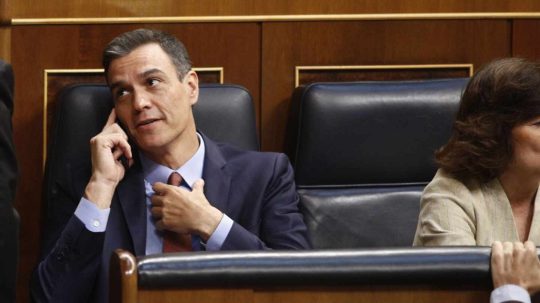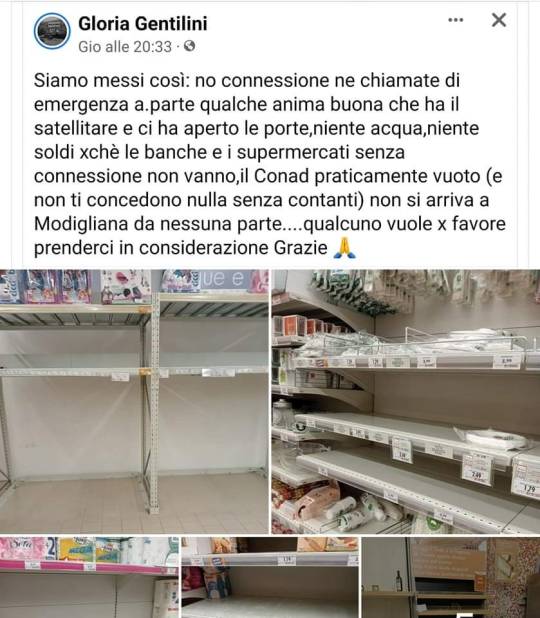#europeas
Text
Las grandes telecos europeas lanzan otra ola de despidos a la espera de más fusiones
Las operadoras de telecomunicaciones en España y en Europa viven una dieta de adelgazamiento durante la última década. Ahora vuelve una nueva ola de despidos en el Viejo Continente a la espera de que suceda la tan ansiada consolidación del sector. Sólo los recortes anunciados por BT, Vodafone y Telecom Italia suman cerca de 70.000 salidas que se producirán principalmente en el próximo lustro. En España, Telefónica ejecutó su plan de salidas incentivadas a finales de 2021 y las otras dos grandes llevaron a cabo sus ERE en la primera parte del pasado ejercicio. Queda por ver cómo afecta la fusión de Orange y Másmóvil.

El último gran movimiento ha sido British Telecom en Reino Unido. Es el antiguo monopolio británico y, como le ha sucedido a sus homólogos en otros mercados grandes, ha ido reduciendo plantilla conforme sus rivales iban ganando cuota de mercado. Pero el anuncio que llevó a cabo la pasada semana es un paso mucho más allá. Puso sobre la mesa 55.000 salidas hasta el año 2030. Esto representa el 42% de su plantilla global, incluidos los empleados subcontratados. No supuso ninguna sorpresa para los sindicatos, que esperaban una reducción importante de empleados debido a la actualización de la red fija a fibra, la digitalización de los procesos y la menor necesidad de mano de obra para el mantenimiento de las infraestructuras.
Hay más paquetes de despidos en ciernes en las grandes operadoras europeas que, al contrario de lo que sucede con BT (que concentrará la inmensa mayoría de las salidas en su mercado de origen), podrían afectar a España. Es el caso de Vodafone. La compañía anunció a principios de esta semana un plan de “simplificación” de estructura con la reducción de 11.000 puestos en los próximos tres años. “La simplificación incrementará la agilidad en nuestros mercados”, aseguró la consejera delegada, Margherita Della Valle. Fue la misma justificación que utilizó la operadora en el ERE que llevó a cabo en España en 2022. Esa simplificación tiene también detrás el argumento de la rentabilidad: según comunicó a los analistas, tres de sus grandes mercados están por debajo de los niveles marcados por el grupo de rentabilidad en el capital, entre los que estaba España. El recorte arrancará en Alemania, Reino Unido e Italia.
El antiguo monopolio italiano TIM, según avanzó hace unas semanas la agencia de noticias Reuters, estaba negociando con los sindicatos para llevar a cabo al menos 2.000 despidos en Italia en un plan de salidas voluntarias. El objetivo era tratar de “agilizar” sus operaciones nacionales después de años de intensa batalla comercial. La sueca Telia anunció otros 1.500 durante este ejercicio, por encima de lo planeado inicialmente (lleva recortando 1.000 empleos a su plantilla desde 2021). La reducción también se extiende a otras compañías relevantes del sector como el proveedor de red sueco Ericsson, que hizo público en febrero un plan para eliminar 8.500 puestos (un 8% del total) en todo el mundo ante la reducción de la demanda de sus servicios. Ante la ralentización de las inversiones de las telecos, compañías como la nórdica o Nokia se ven seriamente afectadas.
Después de años de fuertes inversiones para los despliegues de redes y la actualización de tecnologías, las compañías anuncian “optimizaciones” para mejorar sus rentabilidades, empujadas a la baja por una dura competencia en los grandes mercados. La Comisión Europea ha promovido con su regulación que existieran al menos cuatro operadores relevantes con infraestructura propia, lo que ha disparado la batalla comercial entre los contendientes. Esto, junto con la progresiva ‘commoditización’ de estos servicios de conectividad, han recortado los márgenes de beneficio de estas compañías.
En España, Telefónica es el incumbente y el antiguo monopolio. Desde mediados de la década de los 2000 ha ido completando ajustes de plantilla conforme crecía la competencia y reducía su cuota de mercado. Primero lo hizo con Expedientes de Regulación de Empleo (ERE) y luego con planes de salidas incentivadas (conocidos con las siglas PSI). El último de éstos, que suponía el tercero desde el año 2015, se pactó a finales de 2021, aunque se completó definitivamente a mediados de 2022. Implicó 2.300 prejubilaciones en este país lo que dejó la plantilla de las tres principales filiales en el entorno de los 18.000 trabajadores. En la plantilla se preguntan si habrá nuevos ajustes a las puertas de la celebración del centenario del grupo, que tendrá lugar en 2024. Por lo pronto, tras las elecciones sindicales que se celebrarán en unas semanas habrá que abordar la potencial prórroga del convenio colectivo -cuya vigencia acaba en diciembre- o la aprobación de un nuevo.
Después de los ajustes laborales vivido, la comparativa de Telefónica con otros de sus homólogos en Europa señala el esfuerzo laboral vivido en los últimos años. El gigante británico BT cerró el pasado ejercicio fiscal con 20.700 millones de libras esterlinas de ingresos y una plantilla de 100.000 empleados, junto con otros 30.000 subcontratados. Si sólo se tiene en cuenta los trabajadores ‘directos’, se trata de algo más de 200.000 libras por puesto (230.000 euros al cambio). La teleco española cerró el año 2022 con prácticamente 40.000 millones de euros de ingresos y una plantilla global de 103.000 trabajadores. La ratio es de casi 390.000 euros, sensiblemente por encima de los británicos. Vodafone tiene en torno a 100.000 trabajadores y y 45.000 millones de volumen de negocio (más de 400.000 euros por puesto). La comparativa de Orange: se sitúa por encima de los 330.000 euros.
Las miradas en España también se colocan en la fusión entre Orange y Másmóvil. La transacción, que ahora está siendo estudiada a fondo por la Comisión Europea para su potencial aprobación, se va a configurar como una ‘joint venture’ al 50%. Internamente se da por hecho que habrá duplicidades de puestos, pese a que haya una ‘fusión fría’ que es a lo que se a garran desde los principales sindicatos. CCOO hizo un movimiento insólito el pasado mes de marzo: solicitó por carta a las autoridades europeas que pongan como condición para la ‘luz verde’ el mantenimiento del empleo durante al menos ocho años.
Sea como sea, las tres principales operadoras en España aseguraron a finales del pasado ejercicio que no había planes sobre la mesa para ejecutar despidos masivos durante este 2023. Lo comunicaron en un encuentro organizado por UGT en noviembre de 2022. Desde esa fecha, la situación puede cambiar de manera relevante. No sólo por la situación en Vodafone, que ha puesto ‘bajo revisión estratégica’ su división en España, sino también por la del resto. Mientras en España aún no hay movimientos, en Europa la ola continúa agrandándose.
Fuente: https://www.lainformacion.com/
0 notes
Text
Let it be known that Eddie Munson hates big box stores. They represent everything he’s against: a big piece of capitalist bullshit that underpays its workers and pump out unnecessary products like it’s nothing.
And yet, he finds himself in a Target on a random Sunday evening.
He’s not quite sure how he got roped into doing Chrissy’s shopping for her, something about ‘owing her a favor’ and ‘making up for all the times she had take out the garbage when it was his turn to do so’ or whatever that means. But here he is anyway, pushing a bright red shopping cart in search of every item on her list so she can go on her date with that girl from the concert in peace. The things you do for friends.
Eddie finds the first few items quite easily - they’re on sale and easy to spot with the big display in the middle of the aisle - but once he gets to the fourth item on her list: Fresh Cotton scented candle, he starts to panic just a little.
Why are there so many fucking candles?
He rubs a hand over his face in attempt to make himself focus on the rows and rows of glass jars in front of him, taking a deep breath before he starts looking for the Fresh Cotton scented candle Chrissy wants. Only to find out, there aren’t any.
There is Pure Linen and Natural Cotton and even one that’s called Laundry Day - whatever the fuck that’s supposed to smell like - but there is not one candle that says Fresh Cotton.
Okay. Okay. He can do this. He knows Chrissy like the back of his hand, he’s smelled that candle practically every day, he can totally figure out which candle she wants.
Eddie grabs the first candle that’s vaguely named after a fabric and smells it, but that one isn’t the one he’s looking for. He tries another (closer, but not quite the same) and another (doesn’t even smell like cotton in the slightest), until he’s smelled practically every cotton-linen-laundry candle in the store and his nose has become immune to any smell whatsoever.
Christ, he really is a terrible best friend if he can’t even get her shopping list right.
Something red flashes by in the corner of his eye and Eddie immediately perks up and chases after it. He stops himself from screaming in victory when he sees that he was right and that there is in fact a Target employee in a red polo walking in the main aisle.
“Excuse me!” Eddie calls out. “Excuse me! Can you help me?”
The guy in the red polo turns around and whoa- Eddie didn’t know that they were hiring actual models to work at Target. He’s pretty sure he’s never met a big box store employee that looks this good - with floppy golden brown hair and a chest that fills out that red Target polo really nicely.
“Uh yes?”
“Great!” Eddie gestures the Target guy to follow him back to the candle aisle and grabs the two candles that he thinks are the closest to what Chrissy wants. “Which one of these is Fresh Cotton?”
Target guy frowns and takes the candles from Eddie’s hands, his hazel eyes narrowing as he reads the labels. “Neither? This one is Clean Cotton and the other one is Crisp Cotton.”
“Yes, yes, I know. But Target used to sell Fresh Cotton, I think, at least that’s what my friend’s shopping list says.” Eddie rambles. “So I guess my question is which one used to be Fresh Cotton and got renamed or whatever.”
“Huh.” Target guy shrugs and takes the lid off both the candles, carefully sniffing each of them before finally handing Clean Cotton back to Eddie. “This one smells the most cotton-y to me, so I’d go with this one, dude.”
Eddie feels his eyes light up with relief as he clutches the candle to his chest. “Christ, that’s a relief. Thank you...” He trails off, searching Target guy’s polo for a name tag, only to come up empty.
“Steve.”
“Thank you, Steve.” Eddie beams. He puts the candle into his shopping cart and rummages through the pocket of his leather jacket until he finds Chrissy’s shopping list. Scented candle? Check. “Look, I gotta go. I have at least twenty other things on this list and- hey!”
In one quick motion, Steve has grabbed the shopping list from Eddie’s hands, scanning the items on the list and the items in the cart with precision.
“Dude. Your friend asked for shampoo and conditioner. You bought them that two-in-one crap.” Steve scoffs.
“Is that... bad? Seems to me like it gets the job done faster.” Eddie shrugs.
“Is that bad, he asks. If your friend cares just a little bit about their hair, they’d be devastated.” Steve chuckles. “C’mere, I’ll help you.”
Before Eddie can even protest, Steve has taken his shopping cart from under his nose and gestures for Eddie to follow him. Huh, personal shoppers must be a new thing at Target. He just hopes that Steve doesn’t charge him a surprise hundred dollar fee at the end of the shopping trip.
Turns out, a personal shopper like Steve comes in handy for a Target virgin like Eddie. Steve (obviously) knows the store like the back of his hand and seems to know a lot about the products they sell as well - from the difference between normal and purple shampoo for blonde hair to the package of colored notebooks that Chrissy needs for the next semester. His knowledge is impressive and Eddie can’t help but stare and listen to every word that rolls of Target Guy Steve’s tongue.
(And if he lets a flirty remark or two slip just to see a twinkle in Steve’s eyes in between the shop talk, that’s nobody’s business but his own)
He is a bit confused when Steve starts loading things into the cart that aren’t on Chrissy’s lists, though. Things like highlighters and staples and various arts and crafts supplies.
“What are those?” Eddie asks.
“Hmm?” Steve hums, following Eddie’s gaze to where it’s looking at the small pots of paint in his hands “Oh. Those are for me.”
“You can do that?”
“Uh yeah? That’s the point of a store?”
“Right.” Eddie nods. “Yeah, I mean, duh. Just didn’t know you were allowed to shop on company time.”
“Right...” Steve blinks at him in response.
They go through the rest of the list fairly quickly, much to Eddie’s disappointment. When he first set foot inside the store, he wanted to leave as fast as he could, but now that he’s got Steve around, he doesn’t really want this shopping trip to end.
At least not without Steve’s number saved in his phone.
There are only a few people in line at the register when they arrive and Steve immediately starts putting his things on the checkout belt. As he waits, Eddie lets his eyes linger at Steve’s toned back, at the way the red fabric stretches over the muscles there, at the way those jeans look practically painted on.
Yeah, he really has to get that number before he gets out of here.
“You probably get employee discount, right? Must be nice.” Eddie grins as he starts putting his stuff on the checkout belt.
Steve cocks his head to the side. “No?”
Christ, not giving your employees a discount in your own store is a new low, even for a big company like Target. “Oh sorry, man. That sucks.”
“I mean, I have my teacher’s discount.” Steve shrugs.
Hold up. What?
“Your what?”
“My teacher’s discount?” Steve repeats. “I’m an elementary school teacher and I get a small discount on stuff I need for my class? Like these art supplies?”
“You- you don’t work here?” Eddie squeaks, feeling the heat rise to his cheeks. Oh God, did he just drag a random stranger through a store and make him listen to all of his stupid problems with Chrissy’s shopping lists? This is embarrassing, even for him. “Fuck, I thought- I mean with the polo and- Christ, I’m so sorry.”
But luckily for Eddie, Steve doesn’t seem mad in the slightest. In fact, he just laughs, all bright and clear. “It’s alright, really.”
“But wait, if you don’t work here, why did you help me?” Eddie asks, ignoring the hopeful feeling that starts to bloom in his stomach.
Steve ducks his head for a second, suppressing a grin, before looking back up at Eddie through his eyelashes and fuck, he has no right to look this hot in a freaking polo shirt.
“Because I thought you were cute.”
A bright Target red blush settles over Eddie’s cheeks and there’s nowhere to hide, not even behind his hair because his dumb self from two hours earlier decided to put it up in a high bun.
“Plus, you looked like you were this close to having a panic attack in the middle of the candle aisle.” Steve shrugs. “I’ve been there, and trust me, it’s not a good look.”
The honesty in his voice makes Eddie cackle so loud that even the cashier turns her head to see what all the commotion is about.
“You’re ridiculous.” Eddie says when his laughter dies down.
“Maybe.” Steve says, his eyes already twinkling with amusement. “But did it work?”
Eddie really can’t say no to that.
(He leaves Target that night with two shopping bags filled with Chrissy’s things and a date with Steve the next weekend.)
#steddie#steddie ficlet#steddie fanfiction#eddie munson#steve harrington#steve harrington x eddie munson#stranger things#i have never set foot inside a target so excuse my europeaness for any mistakes#they're idiot4idiot your honor#alice's writing adventures
4K notes
·
View notes
Text

Saint Sophia's Cathedral in Kyiv, Ukraine. February 2015.
#winter#kyiv#ukraine#christianity#snow#winter wonderland#orthodox church#europea#world capitals#eastern europe#february#church
80 notes
·
View notes
Text
siguiendo con la línea de la gente de afuera y de acá que tiene una imagen en la cabeza de argentina como "blanca", me rompe soberanamente las pelotas cuando lo repiten los de afuera sin saber, pero cuando es la misma gente del país me dan ganas de matarlos.
no dudo que sea un poco culpa de ciertos porteños que se piensan que caba es el culo del mundo solo porque no interactúan con otra gente a más de un radio de 20 cuadras en puerto madero que hacen más ruido que otra gente. pero no son los únicos que me preguntan de "donde soy?" desde que nací y muchas veces se sorprenden o no me terminan de reconocer como alguien que pertenece realmente a “acá” les hace ruido mi cara supongo qsy. así como muchos otros que tienen padres de otros países de la misma latam pero por alguna "razon" no se refieren a ellos como argentinos posta o no cuentan tus experiencias a la hora de hablar otras realidades en tu propio pais porque "tus viejos no nacieron acá es distinto".....te recuerdo que tus abuelos venían de afuera también. que te hace más argentino que yo? que haya más inmigrantes europeos en buenos aires? a veces se pasan de joda con los chistes de argentina es italia o españa 2.0. la herencia de argentina no es únicamente la europea dejémonos de joder
#mine#mi viejo es de R.D y mi vieja de flia europea y asi les sali yo y la gente les juro que no se convence cuando les digo que soy de “aca"....#y seamos honestos la gente que tiene padres nacidos en paises limítrofes de arg por más que haya nacido acá#a la hora de ver problemáticas la toman más de allá que acá. Llámenlo racismo xenofobia lo que quieran#pero te niegan tu herencia constantemente como si fuera una minoriao una anomalia de lo que es el pais en vez de otra realidad#GRINGOS NI SIQUIERA PIENSEN ACERCARSE latigringos se comportan#ok to rb
102 notes
·
View notes
Text

A fabulously embossed parade helmet crowned with a laurel of oak leaves, possibly made for the della Rovere of Urbino, attrobuted to Filippo Negroli,
Height: 11.25 in/28.6 cm
Width: 8.25 in/20.9 cm
Depth: 9 in/22.7 cm
Weight: 2.1 lbs/964 g
Milan, Italy, ca. 1532-1535, housed at the Metropolitan Museum of Art.
#armor#armour#helmet#grotesque#europe#europea#italy#italian#milan#milanese#renaissance#themet#metmuseum#art#history
263 notes
·
View notes
Text

Bartolomé Román (Spanish, 1587-1647)
San Pedro Celestino, papa, early 17th century
Museo Nacional del Prado
#Bartolomé Román#spanish art#christian art#european art#san pedro celestino#pope#17th century#spanish#hispanic#latin#southern europe#europea#western europe#art#fine art#classical art#europe#european#oil painting#fine arts#europa#mediterranean#1500s#1600s#catholic#catholic art#catholicism#roman catholic
73 notes
·
View notes
Text
“ Il presupposto, quasi esplicito, su cui sorse l’UE fu che i paesi ‘peccatori’ (Italia e Grecia in particolare) avevano vissuto fino ad allora al di sopra delle loro possibilità, eccedendo in spesa pubblica ovviamente non immediatamente redditizia. Ricordiamo le prediche in proposito. Certo, ogni tanto ci viene detto che basterebbe l’importo dell’italica evasione fiscale per risanare il debito che ci strangola e ci rende sorvegliati speciali all’interno della UE. Ogni volta però si conclude, con un sospiro, che si tratta di un male incurabile. E allora, ancora una volta, non resta che «pestare» quelli che «stanno sotto». E anche, forse soprattutto, a tal fine, si provvede ad instaurare, di volta in volta, un esecutivo «europeista». Il teorema non fa una grinza.
Salvo che in un punto fondamentale, che vorremmo qui brevemente tratteggiare: alle vere e ataviche carenze italiane potrebbe porre rimedio un gigantesco investimento che incrementi proprio la pubblica amministrazione, ma questo è l’esatto contrario di ciò che «chiede l’Europa». È lamento quotidiano, e ben fondato e largamente condiviso, che da noi manchi adeguato e sufficiente personale in tanti settori vitali: magistratura (giudici e cancellieri: il commissario UE alla giustizia ce lo rimproverava cifre alla mano esattamente il 9 luglio scorso), ispettori del lavoro (le morti bianche sono il nostro flagello quotidiano), scuola (abbiamo ancora le vergognose classi-pollaio di gelminiana memoria particolarmente pericolose sotto ogni rispetto), guardie carcerarie (le vicende e i pestaggi recenti sono una macchia), sistema sanitario nazionale (il lamento in proposito fu molto forte quando l’epidemia sembrò soverchiante). E si potrebbe seguitare. Ci ordinano contemporaneamente di ridurre la spesa pubblica, di far funzionare il nostro paese (e di saldare prima o poi il debito). Arduo: «né pentère e volere insieme puossi / per la contradizion che nol consente» (Inferno, XXVII, 119-120). “
Luciano Canfora, La democrazia dei signori, Laterza (Collana: i Robinson / Letture), gennaio 2022. [Libro elettronico]
#Luciano Canfora#letture#leggere#libri#saggistica#saggi#La democrazia dei signori#democrazia#citazioni#eversione#Repubblica italiana#evasione fiscale#Italia#Grecia#UE#Italia contemporanea#debito pubblico#magistratura#scuola#pubblica amministrazione#Unione Europea#morti sul lavoro#intellettuali italiani contemporanei#carceri#Divina Commedia#opinione pubblica#costituzionalismo#Dante Alighieri#Europa#progressismo
20 notes
·
View notes
Text

Estratto dagli archivi segreti della polizia di una capitale europea (1972) - Promo art
#estratto dagli archivi segreti della polizia di una capitale europea#tragic ceremony#camille keaton#tony isbert#máximo valverde#1972#1970s movies#riccardo freda#horror#crime
48 notes
·
View notes
Text
La norma sull'utilizzo delle fonti rinnovabili stabilisce standard non raggiungibili, creando solo frustrazione, mancanza di credibilità e costi elevati. Ecco perché sarebbe meglio un approccio più pragmatico e meno ideologico
Azzeccare previsioni è relativamente semplice, purché non riguardino il futuro. Questa volta però una previsione la facciamo: non vi è alcuna possibilità che gli obiettivi fissati nell’aggiornamento della Direttiva europea (RED III) per quanto riguarda le fonti rinnovabili possano essere raggiunti. Almeno in Italia, ma gli altri stati europei non stanno meglio. L’obiettivo fissato è che al 2030 siano rinnovabili il 42,5% dei consumi finali di energia più un obiettivo non vincolante (ma che significa?) del 45%. Attenzione, questo obiettivo non riguarda la sola energia elettrica, se fosse così già quasi ci saremmo, ma il 42,5 di tutta l’energia. Quindi dobbiamo nello stesso tempo aumentare la quota di energia elettrica prodotta con le rinnovabili e aumentare la quota di elettricità sul totale di energia consumata. E la differenza è enorme. L’elettricità infatti è oggi solo il 21,5 per cento del totale dell’energia consumata.
Per capire di che cosa stiamo parlando è meglio cominciare dai consuntivi, che al contrario delle previsioni presentano numeri certi. Nel 2022, secondo i dati del MASE, solo il 19% dei nostri consumi finali erano da rinnovabili. Sole, vento, idro, geo, ma anche rinnovabili termiche, compresa la legna da ardere, e un po’ di biometano. Nel 2014 era al 17,1. In 8 anni siamo quindi cresciuti di 2 punti. Nei prossimi 7 dovremmo crescere di 23, 5 punti, 12 volte in più del tasso di crescita registrato fin qui. Anche se facessimo oggi tutta l’elettricità con le rinnovabili, cosa impossibile, ci fermeremmo al 31,8, più di 10 punti sotto l’obiettivo. In Europa le cose vanno appena meglio. Siamo al 21% medio, appena due punti sopra l’Italia, grazie soprattutto ad alcuni paesi del Nord Europa, come Svezia e Finlandia, ricchi di idroelettrico e legname.
Da noi la discussione è tutta centrata sulle rinnovabili elettriche, ma occorre capire che in realtà si tratta di perseguire, come detto, un doppio obiettivo. Non solo aumentare la produzione da rinnovabili, ma contemporaneamente aumentare di molto la quota di consumi energetici soddisfatti dall’elettricità. Dal 21,5 % di oggi al 29% nel 2030. Sembrano pochi 8 punti. Ma il combinato disposto fra le due cose, più rinnovabili e più elettricità nei consumi finali in un tempo così breve, comporta obiettivi irrealizzabili. Stessa cosa per le altre rinnovabili termiche.
Diversi studi, TERNA, Confindustria, Università di Padova, hanno fatto i conti e indicato cosa occorrerebbe fare. Bisognerebbe da oggi al 2030 installare 700.000 pompe di calore all’anno. Immatricolare 1 milione di auto elettriche all’anno. Nel 2022 sono state 50.000. Installare 120 GW di nuove rinnovabili al ritmo di quasi 20 all’anno contro i 3 dell’anno scorso e almeno 120 GWh di sistemi d accumulo. Aumentare di 15 volte la produzione di biometano. Naturalmente il mix può cambiare, ma siccome nessuno di questi obiettivi singolarmente ha serie possibilità di essere raggiunto le cose non cambiano. Non credo ci sia un solo esperto di problemi energetici che possa ritenere questi obbiettivi realizzabili. Rimane da capire perché l’Europa si ostini ad alzare l’asticella di obiettivi chiaramente non raggiungibili, creando solo frustrazione, mancanza di credibilità e costi elevati. E perché l’Italia che pure ha fatto molti compiti a casa non faccia presente che forse un po’ di realismo servirebbe. Negli stessi giorni dell’approvazione della Direttiva la Presidenza spagnola ha predisposto un documento dai toni più che allarmistici sulla carenza di una serie di materiali necessari per soddisfare tutte le esigenze. Con il rischio che i costi vadano alle stelle e la dipendenza dalla Cina, dice il documento, raggiunga lo stesso livello di quella precedente dalla Russia. Suona quindi surreale il commento del relatore tedesco Markus Pieper del Ppe secondo il quale “questa direttiva dimostra che Bruxelles può essere poco burocratica e molto pragmatica”. Il punto è che la Ue si è incastrata da sola ponendosi un obiettivo, quello delle zero emissioni al 2050, che la costringe a stabilire tappe intermedie altrettanto velleitarie. L’unico risultato per il momento è la perdita di competitività dell’industria europea, la creazione di mercati, auto elettriche e rinnovabili, per i produttori cinesi, l’aumento dei costi per imprese e famiglie. Nel frattempo il contributo delle emissioni europee al totale mondiale continua a scendere. Soprattutto perché crescono quelle degli altri.
34 notes
·
View notes
Text

Credo nella razza più che nell'educazione, portiamo, qualunque cosa dicesse Danton, la patria nelle piante dei nostri talloni, e portiamo nel cuore, senza saperlo, la polvere dei nostri antenati morti.
-G. Flaubert
12 notes
·
View notes
Text

24 notes
·
View notes
Text
“Me conservo niño, vivo al día, amo el movimiento por moverme, el aire por respirarlo. Moriré por morir... Y todo habrá acabado”.
Umberto Eco, El cementerio de Praga.
17 notes
·
View notes
Text

Non mi esprimo in termini di morale, sia perché è un ennesimo indottrinamento, sia perché non entro nei circuiti di ipocrita compassione social.
Voglio solo portare all'attenzione ciò che succede in una realtà in cui la tecnologia governa la quotidianità.
Denaro, comunicazione, collegamenti, va tutto in malora in un giorno.
Questo è il mondo digitale che esclude ogni altra variabile all'infuori di sé stesso.
O tutto online o niente.
Questo è il mondo del "saremo tutti connessi".
#wef#agenda europea#mondo digitale#futuro#connessioni#propaganda#clima#emergenza climatica#zombie#società#società malata#responsabilità#prigioni#gabbie#svegliatevi#sistema#illusioni#identitá digitale#qr code#tecnologia#aprite gli occhi#manipolazioni#verità#schiavi#catene#mass media#povertà#emilia romagna
51 notes
·
View notes
Text
sí a todo



los europeos no van a vernos nunca como iguales, incluso aunque seamos mejores
#con maslaton no siempre estoy de acuerdo pero en esto sí#coincido total y absolutamente#la superioridad europea es un mito que nos quieren seguir inculcando y no los podemos dejar#nosotros valemos carajo#somos tanto y más#argentina
82 notes
·
View notes
Photo

An elegantly etched Partisan,
OaL: 6.5 in/256.5 cm
Head Length: 30 in/76.2 cm
Width: 7.9 in/20.2 cm
Weight: 4.5 lbs/2024.2 g
France, ca. 1575, housed at the Metropolitan Musuem of Art.
511 notes
·
View notes
Text

Els genets dels Sídhe, per John Duncan. Tremp d'ou en tela, 114'3 x 175'2; 1911.
#art#pintura#Sídhe#Tuatha Dé Danann#Tuath Dé#Aes sídhe#Aos Sí#daoine sìth#daoine sí#Gent blanca#White people#Fair people#fada#raça fadenca#fadenc#mitologia#mitologia europea#mitologia cèltica#mitologia celta#John Duncan#1911
14 notes
·
View notes